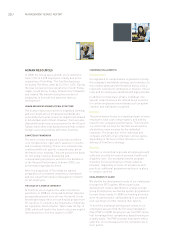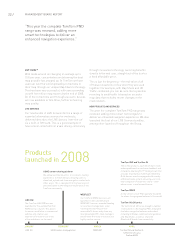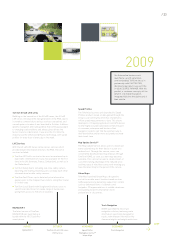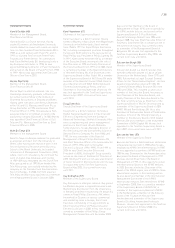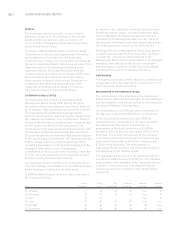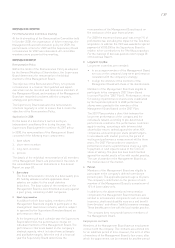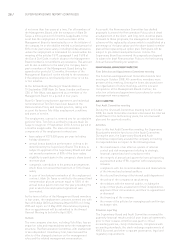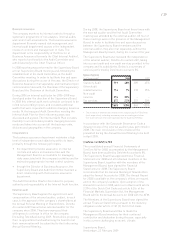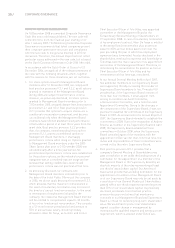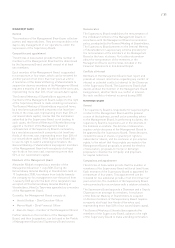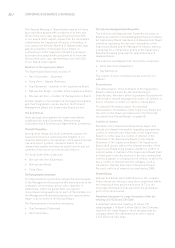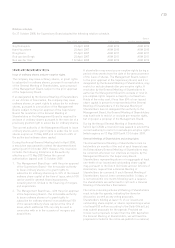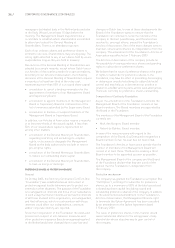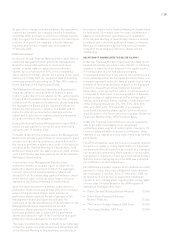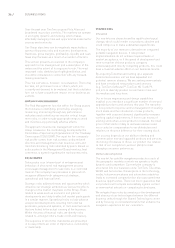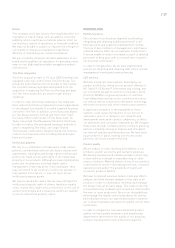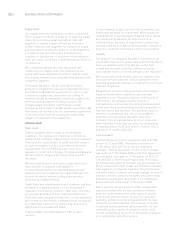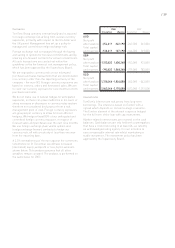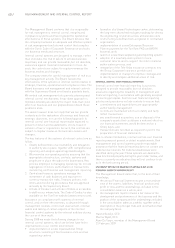TomTom 2008 Annual Report Download - page 32
Download and view the complete annual report
Please find page 32 of the 2008 TomTom annual report below. You can navigate through the pages in the report by either clicking on the pages listed below, or by using the keyword search tool below to find specific information within the annual report.30 / CORPORATE GOVERNANCE
THE DUTCH CORPORATE GOVERNANCE CODE
On 10 December 2008 an amended Corporate Governance
Code (the new code) was published. The new code will
come into force from the financial year starting on or
after 1 January 2009. The Monitoring Committee Corporate
Governance recommends that listed companies present
their corporate governance structure and compliance
with the new code to the general meeting in 2010 for
discussion. Therefore, this Annual Report will not reflect
particular issues addressed in the new code, but is based
on the Dutch Corporate Governance Code 2004 (the code).
In accordance with the Dutch Order of Council of 23
December 2004, we apply all of the relevant provisions of
the code with the following deviations which, together
with the reasons for those deviations, are set out below.
1. For share options issued to Management Board
members after 31 December 2005, we comply with
best practice provisions II.2.1 and II.2.2, as all options
granted to members of the Management Board
during 2006 are subject to performance criteria.
However, as previously disclosed, for share options
granted to Management Board members prior to
31 December 2005, we partly deviate from best practice
provisions II.2.1 and II.2.2. Best practice provision
II.2.1 provides that options to acquire shares are a
conditional remuneration component, and become
unconditional only when the Management Board
members have fulfilled predetermined performance
criteria after a period of at least three years from the
grant date. Best practice provision II.2.2 provides
that, if a company, notwithstanding best practice
provision II.2.1, grants unconditional options to
Management Board members, it shall apply
performance criteria when doing so. Options granted
to Management Board members under the 2005
Share Option plan prior to 31 December 2005 vest
unconditionally after a three year period. No
predetermined performance criteria were established
for these share options, as the industry for personal
navigation was at a relatively nascent stage and we
believed that setting credible (pre-determined)
performance criteria was not practical at that time.
2. As previously disclosed, for contracts with
Management Board members entered into prior to
the date of the Initial Public Offering of the company
in 2005, we do not apply best practice provision II.2.7,
which provides that the maximum remuneration in
the event of involuntary termination may not exceed
the directors’ annual fixed remuneration. In the event
of termination of employment initiated by the
company, the respective Management Board member
will be entitled to compensation equal to 18 months
of his or her fixed annual remuneration. This consists
of a 12-month notice period and a fixed amount of
50% of annual base salary, including holiday
allowance. Alain De Taeye, as founder and former
Chief Executive Officer of Tele Atlas, was appointed
as member of the Management Board at the
Extraordinary General Meeting of Shareholders on
19 September 2008. In case of involuntary termination
of his employment contract, Alain De Taeye is entitled
to the annual fixed remuneration plus an amount
equal to 100% annual bonus paid to him over the
year preceding the year in which his employment
agreement was terminated. As also disclosed in the
shareholders meeting his expertise and knowledge of
Tele Atlas were the main reasons for his appointment
as member of the Management Board. Therefore, in
determining his remuneration his position as former
Chief Executive Officer of Tele Atlas and his
remuneration at that time was considered.
3. At our Annual General Meeting held in April 2007,
two additional members to our Supervisory Board
were appointed, thereby increasing the number of
Supervisory Board members to five. Principle III.5
provides that, if the Supervisory Board consists of
more than four members, it shall appoint from
among its members an Audit Committee,
a Remuneration Committee, and a Selection and
Appointment Committee. Owing to the changes in
the composition of the Supervisory Board, it was not
practical to establish the committees of the Supervisory
Board in 2007. As announced in the Annual Report of
2007, the Supervisory Board intended to establish the
committees in 2008. Due to the resignation of Andrew
Browne as member of the Supervisory Board in April
2008, the Supervisory Board established those
committees in October 2008, when the Supervisory
Board consisted again of five members with the
appointment of Ben van der Veer. Until that time, the
duties and responsibilities of these committees were
carried out by the entire Supervisory Board.
4. Best practice provision IV.1.1 provides that a
company’s General Meeting of Shareholders may
pass a resolution to set aside the binding nature of a
nomination for the appointment of a member of the
Management Board or the Supervisory Board by an
absolute majority of the votes representing at least
one third of issued share capital. Our Articles of
Association provide that a binding nomination for the
appointment of members of our Management Board
or of our Supervisory Board may only be set aside by
a resolution of our General Meeting of Shareholders
passed with a two-thirds majority representing more
than 50% of our issued share capital. As previously
disclosed, we deviate from this best practice
provision because we believe that maintaining
continuity in our Management Board and Supervisory
Board is critical for delivering long-term shareholder
value. We would like to protect our stakeholders
against a sudden change in management by
maintaining the qualified majority and voting quorum
requirement, which is allowed under Dutch law.


